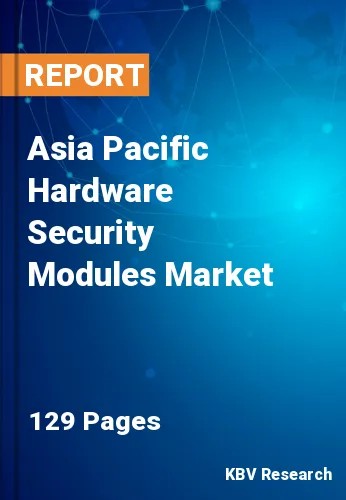
The Asia Pacific Hardware Security Modules Market would witness market growth of 13.6% CAGR during the forecast period (2022-2028).
An HSM's functions include onboard secure cryptographic key generation, onboard secure cryptographic key storage, at least for the highest level and most sensitive keys, which are frequently referred to as master keys, key management, use of cryptographic and sensitive data material, such as performing encryption and digital signature functions or offloading application servers for complete asymmetric and symmetric cryptography.
HSMs are also used to maintain transparent and secure data encryption keys for databases and storage device keys, such as disk and tape. HSMs offer both physical and logical protection against disclosure, unauthorized use, and possible adversaries for these resources, including cryptographic keys. Both symmetric as well as asymmetric (public-key) cryptography are supported by HSMs. The cryptographic material for some applications, such as certificate authorities and digital signatures, consists of asymmetric key pairs (as well as certificates) used in public-key cryptography.
The cryptographic material for other applications, like data encryption and financial payment systems, consists mostly of symmetric keys. Some HSM systems are cryptographic hardware accelerators. In most cases, they cannot outperform hardware-only solutions for symmetric core functions. HSMs may provide considerable CPU offload for asymmetric key operations with performance ranging from 1 to 10,000 1024-bit RSA signatures per second. The importance of performance at greater key sizes has increased. In response to this concern, the majority of HSMs now offer elliptic curve cryptography (ECC), which provides better encryption with lower key lengths.
India is going under rapid digitalization in recent years as the country is growing at an exponential rate. The digital infrastructure is the foundation of wealthy economies, thriving research communities, a formidable military, transparent governments, and a free society. Every day, millions of people throughout India rely on cyberspace's electronic services. Owing to the very high dependability on connectivity and networks, the demand for enhanced cybersecurity infrastructure is increasing and the Indian government is increasingly focusing on it. This factor is stimulating the growth of the regional hardware security module market.
The China market dominated the Asia Pacific Hardware Security Modules Market by Country in 2021; thereby, achieving a market value of $179.1 million by 2028. The Japan market is registering a CAGR of 12.9% during (2022 - 2028). Additionally, The India market would showcase a CAGR of 14.3% during (2022 - 2028).
Based on Deployment Type, the market is segmented into Cloud and On-premise. Based on Application, the market is segmented into Payment Processing, Authentication, Database Encryption, Code & Document Signing, Application-level encryption, PKI & Credential Management, and Security Sockets Layer (SSL) & Transport Security Layer (TSL). Based on Type, the market is segmented into LAN Based/ Network Attached, PCI-Based/ Embedded Pluggins, and USB Based/ Portable & Smart Cards. Based on Vertical, the market is segmented into BFSI, Public Sector/ Government, Aerospace & Defense, and Medical & Life Sciences. Based on countries, the market is segmented into China, Japan, India, South Korea, Singapore, Malaysia, and Rest of Asia Pacific.
Free Valuable Insights: The Worldwide Hardware Security Modules Market is Projected to reach USD 2.2 Billion by 2028, at a CAGR of 12.8%
The market research report covers the analysis of key stake holders of the market. Key companies profiled in the report include Microsoft Corporation, Amazon.com, Inc., IBM Corporation, Microchip Technology, Inc., Thales Group S.A., Atos Group, Futurex LP, STMicroelectronics N.V., Lattice Semiconductor Corporation and Infineon Technologies AG
By Deployment Type
By Application
By Type
By Vertical
By Country
Our team of dedicated experts can provide you with attractive expansion opportunities for your business.
